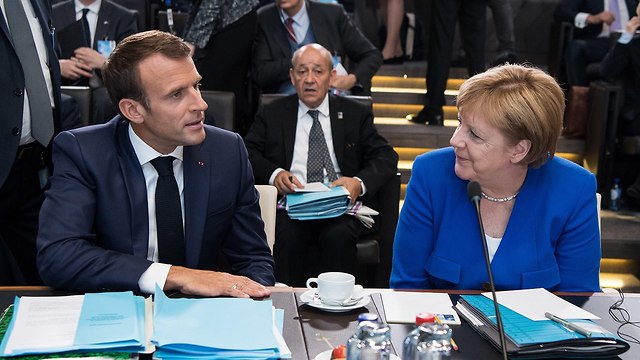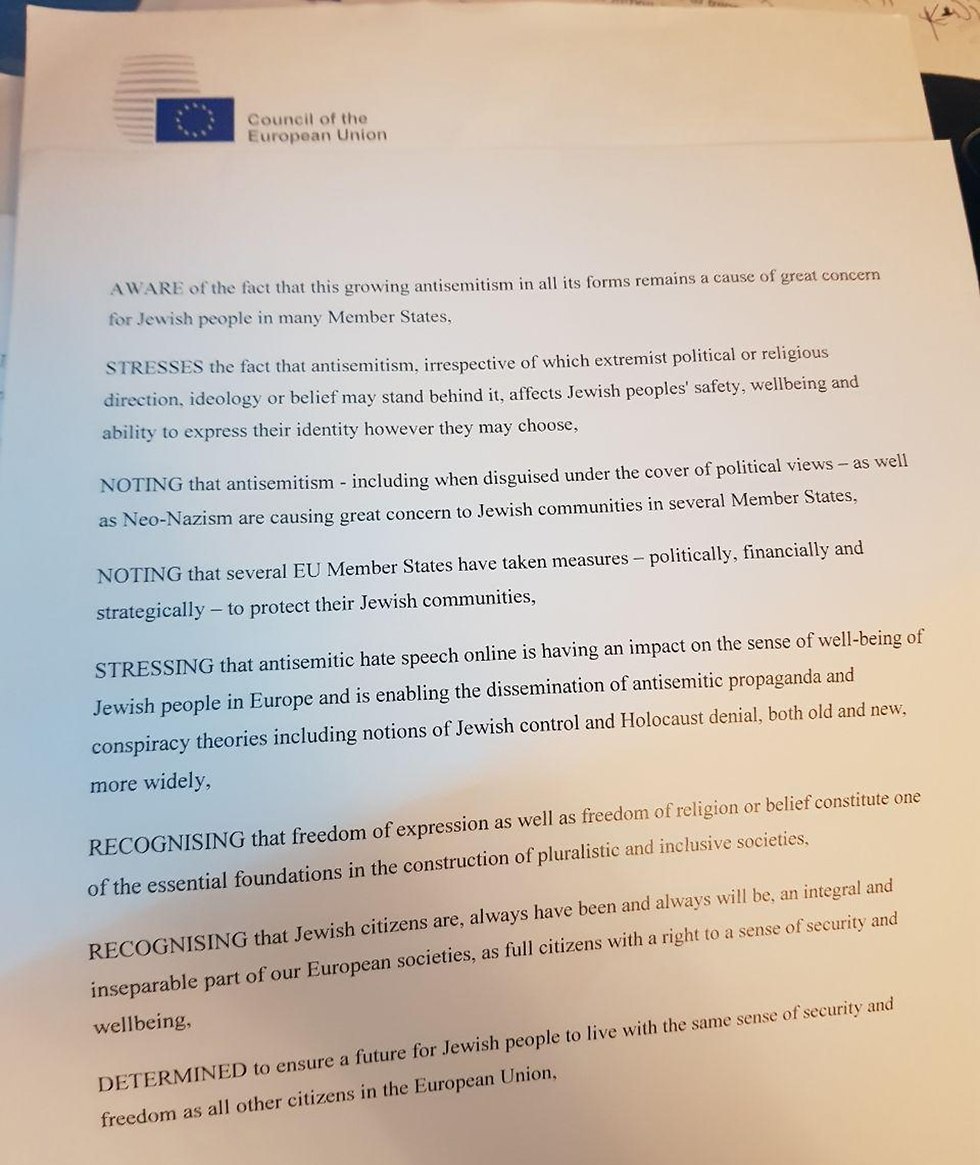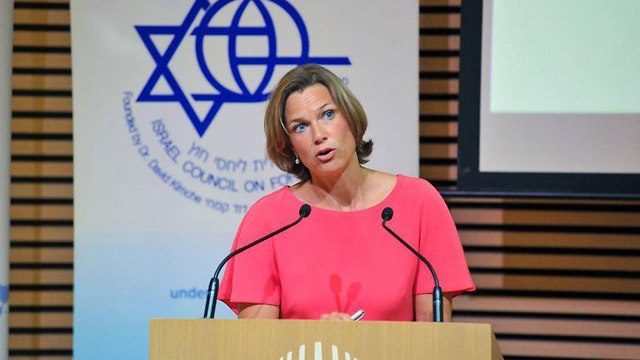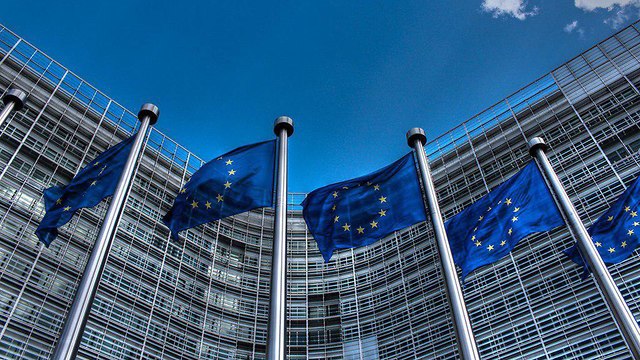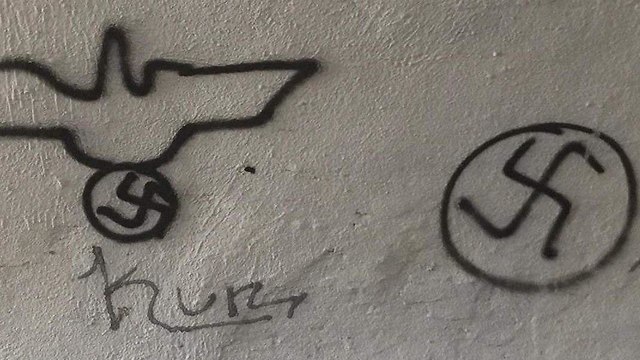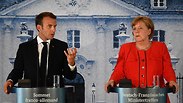
European Union nations have agreed to step up the fight against anti-Semitism and boost security to better protect Jewish communities and institutions across the continent.
The 28-nation EU's interior ministers unanimously approved an 11-page declaration Thursday recognizing a common definition of anti-Semitism and acknowledging Jewish concerns given the prevalence of attacks in recent years.
The Council of the European Union, composed of all leaders of European countries, is expected to also approve the declartion as well on Friday.
The declaration underlines the importance of education about the Holocaust and urges the EU's police agency Europol to point out anti-Semitic terror content online to internet service providers. EU funds are available to improve security.
This is the first time that an official document of the Council of the European Union explicitly mentions the need to unite in the fight against anti-Semitism.
The declaration was co-authored by Austria and the World Jewish Congress over a period of five months and involved frantic diplomatic activity when some European countries initially opposed the statement or its wording. The formulation of the declaration began after representatives of the WJC were invited to appear before the EU's Forum of Ministers of Justice and Interior.
The two main objectors were Sweden, which requested the addition of a reference to Islamophobia, not just anti-Semitism—a demand that was rejected (the document does state that EU countries are determined to prevent and combat anti-Semitism as well as all forms of racism, xenophobia, intolerance and discrimination)—and Spain, which had a more general opposition to the document, but came around ultimately.
According to officials involved in formulating the declaration, the real reason for opposition to the declaration was fear it would serve to stifle criticism of the State of Israel.
Two central players behind the declaration, intervening to ensure a full consensus among the 28 EU states, were German Chancellor Angela Merkel and French President Emmanuel Macron.
Macron's foreign relations adviser persuaded the Spaniards to withdraw their reservations. Baroness Katharina Von Schnurbein, the EU Coordinator on combating anti-Semitism, was the driving force behind the document's formulation.
The Israeli Foreign Ministry, through the Israeli delegation to the European Union and the Israeli embassies in Europe, joined the diplomatic process on its last stretch and assisted behind the scenes in persuading the hesitating countries.
To understand the difficulty of formulating a document agreed upon by all 28 EU member states, it is worth noting that the final declaration had no fewer than 84 drafts.
An important clause was added to the document stating that the Council of the European Union notes "that anti-Semitism, including when disguised under the cover of political views, as well as neo-Nazism are causing great concerns to Jewish communities in several Member States."
The statement said that the EU Council "is determined to ensure a future for Jewish people to live with the same sense of security and freedom as all other citizens in the EU." In addition, the Council recognizes that "the security of the Jewish people is an immediate need requiring immediate action of the Member States and institutions of the European Union."
The document includes a series of prominent operational provisions that European countries are to undertake on behalf of Jewish communities. Among the outstanding points, the 28 countries promise to adopt and implement a holistic strategy to combat and prevent anti-Semitism, provide funding and implement measures to secure communities, promote Holocaust memory education, and pay special attention to anti-Semitism on the Internet.
The World Jewish Congress stressed that although it is not a binding declaration or a pan-European legislation, it can be translated into action. The Congress intends to appeal to the countries of the European Union and demand the implementation of the declaration they signed. This also provides a basis for the various Jewish communities to demand financial assistance from European countries for improving security measures.
The Congress found that there are Jewish communities that have to spend 50 percent of their budget on security, and there are eight European countries that do nothing to protect their Jewish communities (Lithuania, Slovakia, Slovenia, Switzerland, Ukraine, Belarus, Bosnia and Herzegovina and Macedonia) or do very little such as providing protection to synagogues only on Rosh Hashana and Passover Seder night in addition to giving a small budget to the Jewish community for security purposes. On the other hand, there are countries that do a lot, such as Germany, Austria, Belgium, France, Italy (police presence at synagogues 24 hours a day) and Greece (police presence 24 hours a day).
'This document will save lives'
"This is undoubtedly a revolution in the European Union's approach to dealing with anti-Semitism," said the World Jewish Congress, "and that this document will save human lives, if because of it another policeman is added to guard a synagogue and possibly prevent a terrorist attack."
Baroness Von Schnurbein added, "If countries are signatories to the declaration, it means that they are committed to fighting anti-Semitism… This will allow Jewish communities and organizations struggling with anti-Semitism to turn to the various governments and ask: 'what you are doing to increase protection for Jews?'"
Referring to a CNN poll that found that one in five Europeans justify anti-Semitism, Von Schnurbein said "It is shocking but unfortunately not surprising. We see the memory of the Holocaust fading quickly, especially among young people who are less aware. Anti-Semitism is rearing its head and there are countries that are witnessing record levels of anti-Semitism, such as the UK where there are four anti-Semitic incidents daily, and it has nothing to do with the Middle East…"
A senior Israeli official noted that in light of the dramatic rise in anti-Semitism in Europe and CNN's anti-Semitism survey, there is no more opportune time for such a declaration. "Anti-Semitism is not a Jewish problem, it is a European problem. Something is screwed up in European DNA that after 70 years anti-Semitism is rising without any connection to Israel. We don’t need Israel for anti-Semitism; this continent has a malignant disease. Using Israel as an excuse for anti-Semitism must end. Europe must not be freed from responsibility."
A comprehensive survey of anti-Semitism across the continent conducted by the European Union and will be published in the coming days found that 85 percent of European Jews say that anti-Semitism and racism are the most difficult problems they face.















